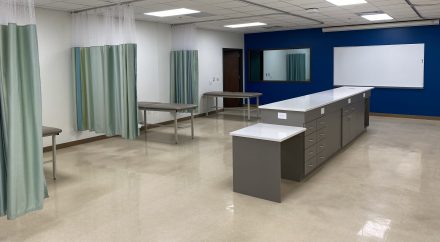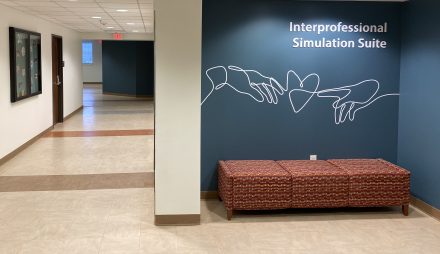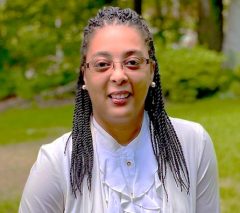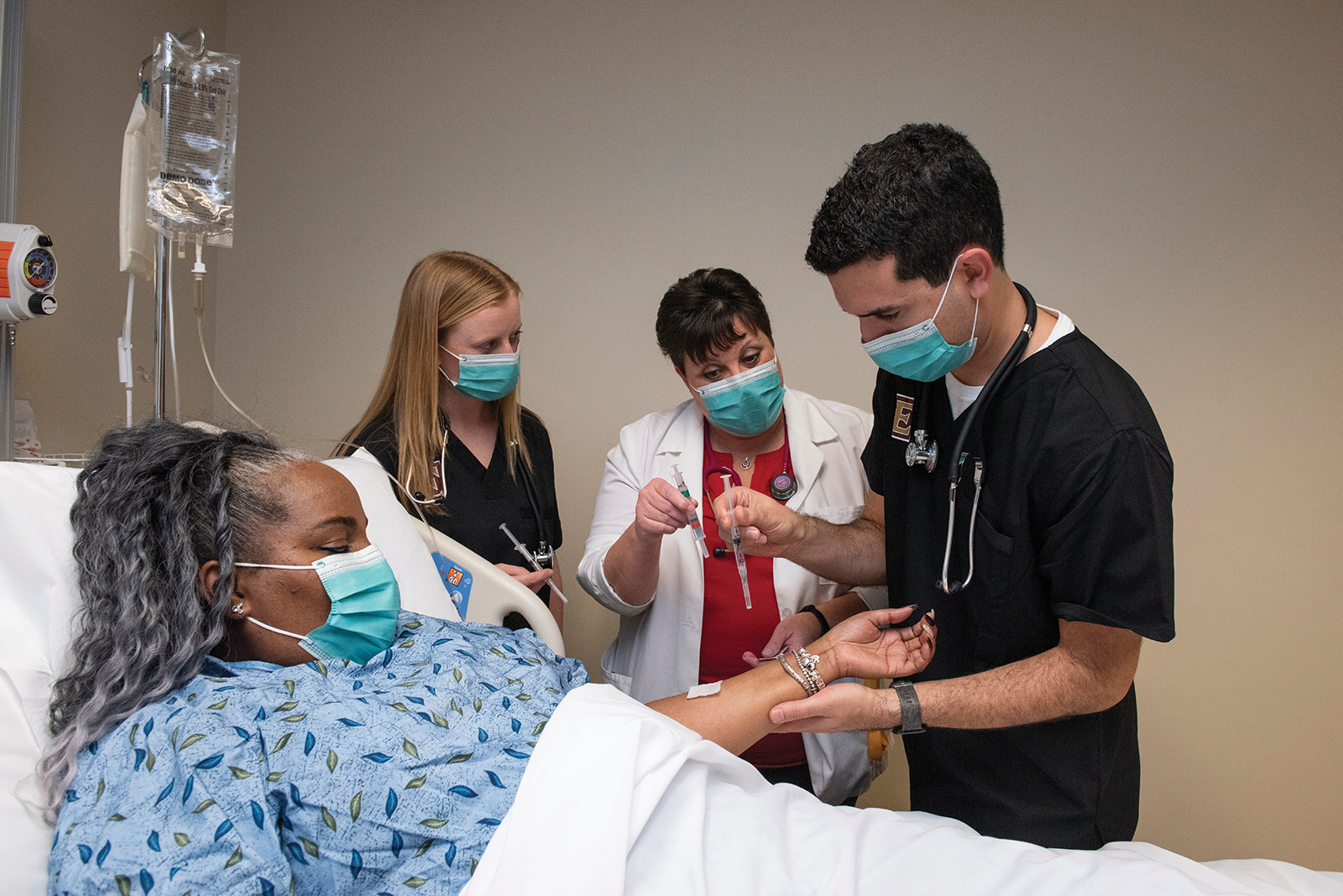Elon’s new nursing program will provide compassionate, skilled leaders when they are needed the most.
It is often said that the world needs Elon university graduates. As the university prepares to welcome the first students to its new nursing program during a raging pandemic, that need has never been greater.
Communities and health care facilities across the country were already challenged in finding enough nurses to meet the high demand for their skills and care, and the COVID-19 pandemic has pushed that demand even higher. Nurses serve as frontline health care workers who are educating the public, caring for the sick and helping the recovering rehabilitate.
And soon, some of the nurses graduating and rushing into those positions will be taking with them an Elon education and degree. The new Department of Nursing has been established within the School of Health Sciences at the Gerald L. Francis Center, and this fall will see the first students enter the four-year Bachelor of Science in Nursing (BSN) program. The department will also be home to an accelerated BSN program for those who have already earned a bachelor’s degree in another field and can earn their nursing degree through a 16-month program.
I believe that the pandemic has demonstrated for us the importance of health care workers, especially front-line health care workers. We’re hopeful that what we are all experiencing is demonstrating to the community and society the value of these health care workers, and inspiring students to pursue careers in health care. — Becky Neiduski, dean of the School of Health Sciences
“Elon is excited to begin offering these future health care professionals an engaged and experiential education rooted in scholarship and service,” says Elon President Connie Ledoux Book. “We know these graduates will go on to be leaders in their fields, caring advocates for patients and skilled practitioners in hospital rooms.”
The new nursing degree is a response to demand within the health care field, feedback from students about programs they would like to see added and the vision outlined in the Boldly Elon strategic plan, which sets the university’s priorities for the next decade. Becky Neiduski, dean of the School of Health Sciences, says initial work to examine the addition of a nursing program was reinforced by what students themselves were saying. “It was clear that not only prospective students but our current students were interested in moving on to nursing careers after they left Elon,” she says. “Nursing is a wonderful opportunity to create interprofessional opportunities in the School of Health Sciences. It’s such a nice fit with what we already have in the Francis Center.”
After a new nursing program was included in the Boldly Elon plan, which was launched in spring 2020, “we took off the training wheels and got to work,” Neiduski adds.
Programs at a glance
The four-year BSN program allows students to satisfy all of their Elon undergraduate degree requirements while completing all nursing prerequisites and the 65-hour nursing curriculum. During their first two years, these nursing students will focus on core courses and prerequisites before moving into the nursing curriculum. Additionally, Elon has created the selective merit-based Nursing Scholars Program for undergraduates pursuing the four-year nursing degree. Students who are selected for the scholars program spend four years working closely with faculty mentors exploring the many opportunities within the field of nursing and identifying ways to advance health equity in local and global communities.

The accelerated BSN program is for those who have already earned a bachelor’s degree in another field of study. During the intensive 16-month program, students will complete the 65-credit-hour nursing curriculum while also completing 540 clinical hours. Both programs will prepare students to sit for the National Council Licensure Examination to become a licensed registered nurse.
The creation of the two programs has involved extensive input from not just those on campus, but from the broader community and health care industry. “We spent many months listening to truly understand what our community needs and how we can prepare these students to be nurse leaders,” Neiduski says.
Students in both programs will have the opportunity to participate in experiential learning and global engagement. They will experience a distinctively Elon program through courses such as “Health Care Relationships,” which focuses on disparity, diversity, equity and inclusion. In the “Crucial Conversations in Health Care” course, students will learn how to effectively and empathetically communicate about difficult topics, such as death and dying. “The goal of these courses is for the future nurse to explore their own identities and understand who they are. Students will be empowered to create habits of health and mind that will make them effective practitioners,” Neiduski says. “We also want them to explore and understand the identities of the patients and clients they will serve.”
The programs also include an emphasis on health informatics, given how the health care industry has expanded its use of data to improve care and increase access for larger populations. “We know that big data in health care and health informatics will become an integral part of a nurse’s work every day,” Neiduski adds.
Book says Elon is focused on preparing students to become highly skilled and engaged nurses who are also well positioned to take advantage of opportunities to serve in leadership roles in their fields. “We want Elon-educated nurses to be prepared to step forward as leaders in health care,” Book says.
A strong foundation
In building the program, Elon leveraged faculty and facilities resources already in place for the university’s longstanding graduate programs. One example is the hundreds of relationships with clinical sites in the local community and across the state where Elon nursing students will complete clinical hour requirements. “We knew we could build on the successes we’ve had and the relationships we’ve built in the Doctor of Physical Therapy and Physician Assistant Studies programs in the School of Health Sciences,” Neiduski says.

One key resource that Elon is building upon with the introduction of the nursing programs is its Client and Standardized Patient Program now used by those graduate programs. Through this simulation program, students gain valuable hands-on experience with clients from the community who have medical conditions as well as standardized patients, who are individuals trained to portray a specific medical case or condition. “The simulation program gives students an opportunity to put a face with a diagnosis, which can change how they see and treat individuals in the future,” says Nita Skillman, director of the Client and Standardized Patient Program. “It brings their textbooks to life.”
Elon is renovating existing space in the Francis Center to expand its simulation offerings. A skills lab on the second floor offers seven hospital beds with high-tech and low-tech manikins for students to learn clinical skills. The manikins can be controlled remotely by a coordinator who can program them to display certain conditions or vital signs, with faculty observing through a two-way mirror. The expanded Interprofessional Simulation Suite on the second floor of the Francis Center will include five traditional clinical rooms, like you might see in a doctor’s office, an intensive care unit room and a hospital room.
In the skills lab and simulation suite, student performance can be recorded with faculty members offering the ability to annotate videos of the students performing tasks to help them learn from the experience. “These spaces provide the opportunity for our students to try their new learned skills, to fail, to make mistakes, to try again and then do that as often as they need to before they go out and see a patient in a clinic,” Skillman says.
Nursing students will also have interprofessional education opportunities with students in the physical therapy and physician assistant studies programs. That experience will teach them about working with other providers and as a team, Skillman adds. “You have to learn how to communicate with other health care professionals.”

Plans call for Elon’s Department of Nursing to have at least 12 faculty members by year four, with faculty added as more students join the program. Jeanmarie Koonts was hired in July 2020 as interim department chair and served as a vital partner in the North Carolina Board of Nursing Application process. Tiffany Morris, an experienced nurse educator and practitioner, has been hired as the inaugural department chair. The university expects to have about 50 students admitted to the program each year, which would mean more than 300 nursing students at Elon by fall 2024. “This will effectively more than double the enrollment of the School of Health Sciences,” Neiduski says.
Planning for the nursing degree programs began well before the COVID-19 pandemic, but Neiduski says that seeing nurses work on the front lines to combat this public health crisis has strengthened the university’s sense of purpose in launching this new educational opportunity. “I believe that the pandemic has demonstrated for us the importance of health care workers, especially front-line health care workers,” she says. “We’re hopeful that what we are all experiencing is demonstrating to the community and society the value of these health care workers, and inspiring students to pursue careers in health care.”



